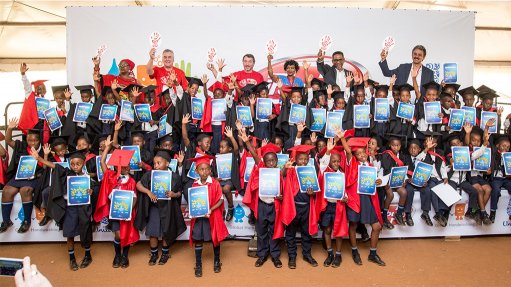
2.8 million children throughout Africa do not reach the age of five, this is caused by avoidable illnesses such as diarrhea and pneumonia.
On Thursday, 13 October Unilever and representatives from the Department of Basic Education and UNICEF celebrated the life-saving habit of handwashing with learners and their parents from M.C. Weiler Primary School in Alexandra. Unilever’s Lifebuoy reiterated the importance of hand washing through their “High 5 for Handwashing’ programme.
“Teaching young children a healthy handwashing routine with soap and water at specific occasions is very important and can help prevent the spread of diseases and save lives. It is with this mindset that during Global Handwashing Day, we are excited that Lifebuoy, has reached over 337 million people across 28 countries with its behaviour change programmes,” says Peter Cowan, Unilever South Africa’s Executive Vice President.
“Global Handwashing Day takes place annually on the 15th of October and is celebrated by over 200 million people in more than 100 countries around the world,” says Mr Hervé Ludovic de Lys, Coutry Director, UNICEF.
“On this day, we aim to highlight the importance of handwashing with soap as a potentially lifesaving habit. It was great to see that organisations such as Unilever are encouraging consumers to do good while doing well,” Hervé.
Recognising the need for ongoing intervention and education prompted Lifebuoy’s ongoing pledge to its awareness programmes. The two pillar approach focuses on the neonatal phase when children are most vulnerable to infection as well as the primary school phase when children are more susceptible to behaviour lessons and can act as ‘agents of change’, spreading the handwashing solution message among their families and friends.
“High 5 for Handwashing” is part of Lifebuoy’s Help a Child Reach 5 campaign and is a symbolic gesture that transcends cultural, geographical and language barriers, galvanising local communities to adopt the lifesaving habit of handwashing with soap. The programme teaches children and adults that washing hands before preparing food and eating meals, after using the bathroom and during bathing can save lives.
“This initiative continues to align to the Unilever Sustainable Living Plan, which has, to date, helped around 482 million people to improve their health and hygiene, through handwashing and oral hygiene,” explains Cowan.
“Lifebuoy has educated over 11 million South Africans, including over 2 million children in 4000 schools and it is great to have helped another 1500 children this Global Handwashing Day,” he continued. “We are well on our way of reaching our 2020 goal of teaching 18 million South Africa proper handwashing habits.”
Through this programme, Lifebuoy aims to increase the impact of its incredibly successful School of 5 programme and replicate it with other Unilever leading brands. This week, another 30 000 learners from 31 schools will start the Unilever brightFuture Schools Programme, beginning with the healthy habit of handwashing with Lifebuoy.
“I wish to acknowledge the immense contribution that our partners Lifebuoy and UNICEF are making in the lives of many school children across South Africa. For us, it is important that we continue to work together to create a healthy school environment by promoting the general health and wellbeing of our learners and educators. Through such initiatives, we aim to further address and facilitate early identification and treatment of health barriers to learning in order to empower the future leaders of our country,” says Dr Granville Whittle, Deputy Director-General: Care and Support service, Department of Basic Education.
“We know that healthy children have a better chance of having a bright future. The children of today are the doctors, nurses, policemen and astronauts of tomorrow. Unilever’s commitment is to enable them to reach their full potential by educating them with the correct health and hygiene habits. The children we educate will not only practice these habits, but will take the message home, sharing the knowledge with their parents, siblings and friends to create healthier communities. Our vision is a world in which the everyday brands you love can help to make the world a better place,” concludes Cowan.